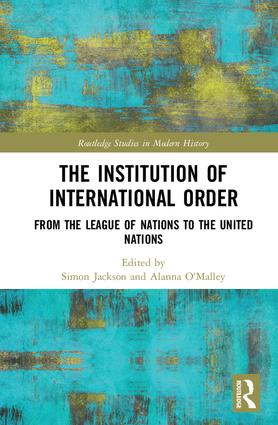In this post Alanna O’Malley and Simon Jackson introduce their new edited collection on ‘The Institution of International Order’, out now with Routledge.
 In recent weeks and months, the United Nations has been in the international headlines once more as the Security Council deliberates over the crisis in Syria, among a host of other challenges currently confronting international peace and security. Media reports of the organisation have focused on the difficulties of even reaching a consensus during Security Council debates, let alone the possibility of formulating a solution. This view contributes to a widespread and tenacious misconception about the UN as a blocked institution, unable to act to resolve geopolitical challenges, and thus, (runs the argument), following in the footsteps of its ‘failed’ predecessor, the League of Nations.
In recent weeks and months, the United Nations has been in the international headlines once more as the Security Council deliberates over the crisis in Syria, among a host of other challenges currently confronting international peace and security. Media reports of the organisation have focused on the difficulties of even reaching a consensus during Security Council debates, let alone the possibility of formulating a solution. This view contributes to a widespread and tenacious misconception about the UN as a blocked institution, unable to act to resolve geopolitical challenges, and thus, (runs the argument), following in the footsteps of its ‘failed’ predecessor, the League of Nations.
Such views lumber on, zombie-like, but fail to take account of a dramatic shift in our scholarly understanding of these institutions. Over the past decade international historians such as Patricia Clavin, Mark Mazower, Susan Pedersen, Glenda Sluga and Meredith Terretta, among others, have decisively re-opened debate on the role of the United Nations and the League of Nations in twentieth century history and in the emergence of the contemporary world. The League in particular has been signally revitalised as an object of study, becoming a focus for new understandings of empire, decolonisation, international law, the politics of expertise and more.
The new book we have edited – The Institution of International Order: From the League of Nations to the United Nations – builds on these insights and draws on some of the best emerging scholarship on the League and UN.
It examines the internationalism of the League and UN as a varied, interlinked process best understood through a global approach that requires the archival and linguistic skills of a whole team of historians. We also bring together the two institutions in a single chronological frame, looking at a period from the 1920s to the 1970s to consider how the contrasts and continuities between the League and UN have shaped the international order.
The result is a portrait of how the League and the UN’s internationalism was generated, circulated and reworked all around the world – in Brazil, Japan or Lebanon as much as in Geneva and New York City. In other words, as Susan Pedersen puts it in her foreword to the book, we have aimed for a multi-local and global perspective on the League and UN.
With chapters on a wide range of topics, from José Antonio Sanchez Roman’s superb essay on economic sovereignty, Latin America and the League, to Nova Robinson’s magisterial work on the pursuit of women’s rights by groups such as General Oriental Feminist Alliance, to Andrew Arsan’s probing account of how Charles Malik’s interwar visions of Lebanon shaped human rights at the UN, the book takes a wide-angled view of the twentieth century. By thinking with – and tracing connections across – the orthodox watershed of 1945, the contributors nuance the sharp discontinuity usually perceived between the League and the UN. As a result, we show how various issues, such as the right to petition international organisations in Nathan A. Kurz’s work, developed in dialogue with, rather than because of, the ending of the Second World War, subsequent decolonisation and the dissolution of the world of empires.
The book as a whole shows that to better grasp how international organisations operate today, not least in the case of Syria, we need to appreciate not just how the League and the UN have acted as central platforms for producing the norms and systems that shape the contemporary world, but also how they have mobilised and channelled the creativity of internationalism at sites all around the world, and then been shaped by that networked activism.
If more work is needed to develop this approach, particularly by further diversifying the archival and linguistic base of international history as a field, and by developing collaborative research practice among historians in the field, this book, combining global, national and local perspectives on the institutions, practices, and visions of internationalism across the twentieth century, takes a step in that direction.
Alanna O’Malley is Assistant Professor of History and International Relations at Leiden University in The Netherlands. Simon Jackson is Lecturer in Modern Middle Eastern History at the University of Birmingham.